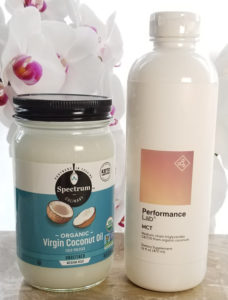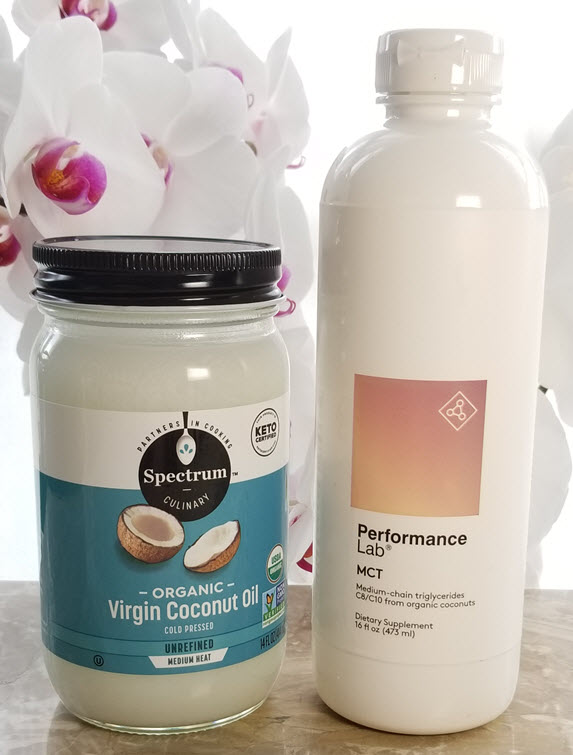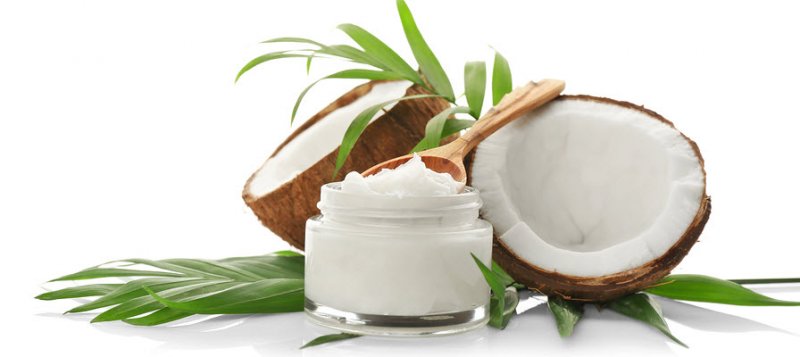Table of Contents
Coconut oil is extracted from the white flesh of mature coconuts harvested from coconut palm trees (Coco nucifera).
 Many neurohackers use coconut oil along with each nootropic stack dose to help the absorption of any fat-soluble supplements in their stack.
Many neurohackers use coconut oil along with each nootropic stack dose to help the absorption of any fat-soluble supplements in their stack.
But coconut oil has some powerful nootropic properties of its own. In fact, so far we have well over 3,000 clinical studies published on PubMed alone.
Up to 65% of coconut oil is comprised of medium chain fatty acids (MCTs). These fatty acids are designated by the number of carbon molecules in a chain from 6 – 12.
At the upper end of the carbon chain, lauric acid (C-12) has 12 carbon molecules and behaves more like a long-chain fatty acid in your digestive system. But does quickly arrive in your liver for conversion to ketones. And is not stored in fat tissue like other dietary fats.
Caprylic acid (C-8) and capric acid (C-10) bypass your lymphatic system and travel directly to your liver to be converted to ketones. These ketone bodies then travel throughout your body as an alternative fuel source to synthesize ATP in mitochondria.
Fatty acids cannot cross the blood-brain barrier. But research has shown that caprylic acid (C-8), if not converted to ketones in your liver, can cross into the brain. For use by glial cells to create ketones within cells in your brain.[i]
Both coconut oil and MCT oil provide nootropic benefits and contribute to brain health.
In this review we’ll dig into the science on how coconut and MCT oil help optimize your brain.
Coconut oil helps:
- Brain Energy. The medium-chain triglycerides (MCTs) in coconut oil bypass your normal digestive system and go straight to your liver where they are converted into ketones. Ketones are carried throughout your body including your brain for use in the citric acid cycle to produce Adenosine Triphosphate (ATP). ATP created in your mitochondria improves alertness, cognition, memory and mood.
- Anti-stress. Research has shown that the medium-chain triglycerides in coconut oil help increase antioxidant levels in the brain. And increases serotonin. Providing an anti-stress effect.
- Neuroprotectant. Coconut oil decreases mitochondrial dysfunction that can be caused by Amyloid-β plaques which are implicated in Alzheimer’s disease. And drug-resistant epilepsy patients have found that the ketones provided by coconut oil can help reduce seizure frequency.
Overview
Coconut oil is extracted from the seed or fruit of the coconut palm (Cocos nucifera).
For nootropic use, do not confuse coconut oil with “palm oil” which is extracted from the fleshy fruit of the oil palm (Elaesis guineensis).
Coconut oil consists of 92% saturated fatty acids, 6% monounsaturated fatty acids, and 2% polyunsaturated fatty acids. About 60% of the fatty acids in coconut oil are medium-chain fatty acids (MCFA).
 Palm oil contains about 50% saturated fatty acids, 40% monounsaturated fatty acids, and 10% polyunsaturated fatty acids. It contains less than 0.5% MCFAs.
Palm oil contains about 50% saturated fatty acids, 40% monounsaturated fatty acids, and 10% polyunsaturated fatty acids. It contains less than 0.5% MCFAs.
The coconut palm originates from Southeast Asia, and the islands between the Indian and Pacific Oceans. It is thought that the fruit of the coconut palm was brought to India and East Africa. Then introduced to West Africa, the Americas and other tropical regions of the world.
The “coconut tree” is the most naturally widespread fruit plant on Earth. In India, it’s called kalpa vriksha; “the tree which provides all the necessities of life” which roughly translates to “the tree of life”.
All parts of the fruit of the coconut tree can be used. The husk fiber is raw material for the production of carpets, car seats, and as fertilizer. The stalk and leaves of the plant are used in construction, and for producing sugar, vinegar and alcohol.
Virgin (unrefined) coconut oil is a potent antioxidant, anti-tumor, anti-bacterial, anti-viral, and anti-fungal.
Coconut oil has been used for treating Alzheimer’s, preventing heart disease and high blood pressure, helps cure urinary tract and kidney infections, reduces arthritis inflammation, prevents cancer, boosts your immune system, helps gallbladder disease and pancreatitis.
Coconut oil improves skin health, prevents gum disease and tooth decay, prevents osteoporosis, improves type II diabetes, assists weight loss, helps build muscle, benefits hair health, helps get rid of candida and yeast infections, is anti-aging and balances hormones.
As a nootropic, coconut oil helps improve cognition and memory. And it boosts energy and endurance.
Coconut Oil vs. MCT Oil: What’s the Difference?
Extra Virgin or Virgin (unrefined) Coconut Oil is composed primarily of saturated fatty acids.
Saturated fats consist of fatty acids whose carbon chain is “saturated” with hydrogen. Fatty acids are chain-like molecules of carbon, hydrogen and oxygen linked in groups of three to a backbone of glycerol.
When coconut oil is consumed, the fatty acids separate from their glycerol backbone during the digestion process.
When you eat fat, its digested and makes its way through your intestinal wall. Most of this digestion occurs in the upper part of the intestine using digestive lipases (digestive enzymes) which act on fat (triglycerides) that has been emulsified with the aid of bile acids.
The duration of fat digestion and
absorption depend on the length
of the fatty acid chain.
The fatty acid chains are classified as long chain fatty acids (LCFAs), medium chain fatty acids (MCFAs) and short chain fatty acids (SCFAs).
Each of these fatty acid subgroups are broken down further; short- (C2 – C6), medium- (C8 – C12) and long- (C14 – C24) chain fatty acids.
LCFAs are transported by carriers in the lymph system and end up in your liver or other tissues. Once they enter cells, they combine with coenzyme A to form acetyl-CoA chains.
These acetyl-CoA chains are transferred into mitochondria within cells, where they are broken down into acetyl-CoA units. This process is called β-oxidation.
(The medium chain fatty acids from coconut oil skip the lymph system and go straight to your liver. Which is important and which we’ll cover in a minute).
Ketones and Ketone Bodies
The acetyl-CoA produced by β-oxidation enters the citric acid cycle in mitochondria. The energy released in this cycle is captured as ATP molecules.
 This process of ATP generation is disrupted during fasting, starvation, a low carbohydrate diet, strenuous exercise or uncontrolled type 1 diabetes.
This process of ATP generation is disrupted during fasting, starvation, a low carbohydrate diet, strenuous exercise or uncontrolled type 1 diabetes.
In this case, acetyl-CoA is diverted to form acetoacetate, beta-hydroxybutyrate, and their breakdown product acetone which are known as “ketone bodies”.
These ketones are released by your liver into the blood. And all cells in your body with mitochondria can use these ketones. These ketones are converted into acetyl-CoA which can be used in the citric acid cycle to produce ATP.
Unlike free fatty acids, these ketones can cross the blood-brain barrier and are available to help produce ATP in mitochondria.
If the cells do not immediately need the energy molecule, these long chain fatty acids are shunted into and stored in adipose (fat) tissue. This is nature’s way of keeping energy stores in reserve without the fats needing to go through the liver process again.
Medium-Chain Fatty Acids and Ketones
Short-chain and medium-chain fatty acids on other hand skip this process. And your blood transport system sends them straight to your liver. Where they immediately enter the process to begin making ketones.
And because they bypass your lymph system, your body does not store these medium-chain fatty acids in adipose (fat) tissue to use later when energy is low.
This direct transport to your liver is how they are able to supply energy more rapidly (similar to carbohydrates).
Here’s where we get to the significance and uniqueness of coconut oil. It’s made up of about 90% saturated fats. And nearly 60% of the fats in coconut oil are medium chain fatty acids.
Coconut oil is composed of the fatty acids, caprylic acid C-8 (8%), capric acid, C-10 (7%), lauric acid C-12 (49%), myristic acid C-14 (8%), palmitic acid C-16 (8%), stearic acid C-18 (2%), oleic acid C-18 (6%) and 2% of C-18 linoleic acid.
Medium chain fatty acids are also known as medium chain triglycerides (MCTs). MCTs are produced by hydrolyzing coconut oil and esterifying the fatty acids shorter than lauric acid (C-12) with glycerol.
Recently, however, manufacturers have started to produce a type of MCT oil that contains lauric acid—usually 30%. A tablespoon of this MCT oil typically contains 12 g of medium-chain fatty acids (lauric 4.45 g, caprylic 3.35 g, capric 4.00 g).
Recent research however has shown that lauric acid (C-12), even though it is classified as a medium-chain fatty acid, acts more like a long-chain fatty acid. Because it has a higher propensity to be absorbed via your lymphatic system instead of going straight to your liver.
Logic tells us that this delay would imply that it takes longer for lauric acid to convert to ketones than caprylic acid (C-8) and capric acid (C-10).
Research has shown that using MCT oil produces a large rise in blood ketones that return to baseline levels within about 3 hours. But ingesting straight coconut oil results in a delayed and less prominent rise in ketone bodies.[ii]
This doesn’t make coconut oil or MCT oil containing lauric acid any less of a nootropic. It only means your energy boost from consuming this type of MCT oil will not be as quick.
In summary, MCTs are absorbed intact from your small intestine, and do not undergo the normal digestive process. They are directly used in your body to create ketones that help produce energy.
MCTs are widely used in infant formulas, nutritional drinks for athletes and in some cases as an emergency IV (intravenous) solution.[iii]
How does Coconut oil work in the brain?
Coconut oil boosts brain health and function in several ways. But two in particular stand out.
- Coconut oil is an alternative brain cell fuel supply. Your brain depends on glucose as its main source of energy. Making up only 2% of your total body weight, it consumes about 20% of your body’s glucose-derived energy.
Carbohydrates from food are broken down into glucose which is used for energy, or stored as glycogen in your liver and muscle tissue.
Glucose metabolism provides fuel for ATP fuel generation, neurons and other brain cell maintenance, and contributes to neurotransmitter synthesis.
When your body and brain are deprived of dietary carbohydrates, your liver becomes the sole provider of glucose to feed your hungry brain.
When the glucose runs out either from dieting, starvation or age-related disruptions in glucose metabolism, you need another fuel source. If left unchecked, it leads to one of several neurodegenerative diseases.[iv]
The good news is your body has a built-in backup plan. This alternate energy fuel supply are called ketone bodies which your liver derives from fatty acids in your diet, or body fat.
These ketones (beta-hydroxybutyric acid, acetoacetate and acetone) are released by your liver and taken up by your brain. Then shuttled into mitochondria to be used in the citric acid cycle to create ATP.[v]
Now, while you can provide the ketones your brain needs by eating a very high fat, low carbohydrate ketogenic diet, it’s not necessary.
The medium chain fatty acids (MCFA) in coconut oil can provide these ketones directly to create ATP.[vi]
- Coconut oil may help brain disorders. Coconut oil and its components have been shown to help treat a number of neurological diseases.
Caprylic acid found in MCTs have been shown to significantly increase mitochondrial oxygen consumption. Amyotrophic lateral sclerosis (ALS) patients have reported a significant improvement in quality of life while using caprylic acid.[vii]
Drug-resistant epilepsy patients have found that a ketogenic diet can reduce seizure frequency between 50 – 90%.[viii] And MCTs which are quickly converted to ketones are an important component of a ketogenic diet.
Decades of research has implicated a build-up of Amyloid-β plaques in Alzheimer’s disease. Recent research has shown that coconut oil decreases mitochondrial dysfunction caused by these plaques. And that neurons are more likely to survive in the presence of coconut oil.[ix]
Coconut & MCT oil nootropic benefits
Coconut oil is not just a good healthy fat that boosts the bioavailability of fat-soluble nootropics in your stack. It’s got exceptional healing properties as well.
But first, a reminder that your brain is nearly 60% fat. And recent research has shown that fatty acids are among the most crucial molecules for the fully optimized brain.[x]
Essential fatty acids are required for maintenance for peak brain health. But cannot be synthesized in your body. And must be obtained from your diet.
Coconut oil is composed of up to 60% medium chain fatty acids (MCFAs), with caprylic and capric acid compromising 21% of these MCTs in virgin coconut oil.[xi]
MCTs are converted to ketones in your liver which are then used as an alternative fuel supply created by mitochondrial ATP synthesis.
But caprylic acid also crosses your blood-brain barrier. And we have evidence showing that glial cells, in particular astrocytes, are also able to metabolize MCTs to ketones. Which are then shuttled into neurons for alternative energy.[xii]
Studies show Unrefined Coconut Oil and MCT Oil provide protection before and after a stroke. It can delay the incidence of stroke as well as increase survival after a stroke – it has antioxidant benefits, improves mitochondrial function, decreases inflammation, and increases brain-derived neurotrophic factor (BDNF).
Coconut oil is also anti-ulcer, anti-fungal, helps burn belly fat, heals wounds, is anti-inflammatory, helps reduce oxidative stress to boost testosterone, reduces a swollen prostate, improves LDL to HDL ratio, improves bone health and can be used as a sunscreen.[xiii]
How does Coconut & MCT oil feel?
I personally use either a tablespoon of unrefined coconut oil or MCT oil each time I take my nootropic stack. I have noticed that if I do not take a tablespoon of coconut oil, my nootropic stack does not work nearly as well.
 Coconut and MCT oil helps the bioavailability of the fat-soluble nootropics in your stack. And provides additional nootropic benefits because it provides ketones your mitochondria can use for making ATP. Increasing your energy levels.
Coconut and MCT oil helps the bioavailability of the fat-soluble nootropics in your stack. And provides additional nootropic benefits because it provides ketones your mitochondria can use for making ATP. Increasing your energy levels.
The majority of the reviews for coconut oil talk about its use for weight loss. But reports for MCT oil are primarily about the benefits to brain health.
Neurohackers report that MCT oil increases alertness and focus. Others say their brain is clearer and they feel energized throughout the day.
Some say they feel a significant improvement in mood. Appetite is suppressed and their happiness level is elevated for about 4 hours.
Dosing a tablespoon of coconut or MCT oil 2 or 3 times per day should provide you with a steady flow of energy.
Coconut & MCT Oil Research
MCT Oil is anti-seizure
A study in 1986 found an association with MCT levels in children suffering from seizures. And higher blood levels of MCT correlated with fewer seizures.[xiv]
This 1986 study was the inspiration that launched multiple studies since on using MCT oil for treating seizures and symptoms of epilepsy.
A more recent study (2013) found that capric acid (C-10) rather than caprylic acid (C-8) was the main player in seizure control.[xv]
One of the main ways of controlling seizures in epilepsy is a ketogenic diet. Now anyone who has tried to stay with a strict diet for any length of time can attest to how difficult it is. Especially with children.
So, in 2014, researchers made a significant discovery that could simplify the lives of anyone dealing with seizures. The study found that it was capric acid (C-10) that increased mitochondria which elevated the seizure threshold. In other words, more C-10 and you have less seizures.
The researchers concluded, “This finding could be of significant benefit to epilepsy patients who are currently on a strict ketogenic diet. Evidence that C-10 on its own can modulate mitochondrial number raises the possibility that a simplified and less stringent C-10-based diet could be developed.”[xvi]
Coconut oil is anti-stress
Research has shown the potential antidepressant effects of medium-chain fatty acids found in food. But scientists in Malaysia wanted to find out if virgin unrefined coconut oil provided a similar benefit.
The aim of this study was to determine the anti-stress and antioxidant effects of virgin coconut oil. The research team performed several stress tests on groups of mice. Virgin coconut oil was compared to the popular prescription anti-anxiety med Diazepam (Valium®).
The scientists found that the mice using virgin coconut oil had higher brain antioxidant and serotonin levels, and reduced adrenal gland weight. Cholesterol, triglycerides, glucose and corticosterone levels were also lower.
The researchers concluded that virgin coconut oil had potential as an anti-stress functional oil.[xvii]
MCT oil improves cognitive function
Glucose is your brain’s primary source of energy. But in Alzheimer’s disease, there appears to a be a significant decrease in the brain’s ability to use glucose for energy.
We now have scientific evidence that suggests ketone bodies are an effective alternative brain energy source.
So in 2004, researchers conducted a study with Alzheimer’s patients and MCT oil. This now famous study, 20 subjects with Alzheimer’s disease or mild cognitive impairment consumed a drink containing MCTs or a placebo.
Significant increases in ketone body levels were observed within 90 minutes of MCT oil treatment. And testing showed significant improvements in cognition and memory in all Alzheimer’s subjects using MCTs compared to placebo.[xviii]
Coconut oil may help prevent Alzheimer’s
Dr. Mary Newport brought widespread attention to the use of coconut oil and MCT oil for treating Alzheimer’s. She gave her husband with early-onset Alzheimer’s MCT oil and coconut oil. And reported a reprieve from Alzheimer’s symptoms and improved quality of life for several years.
Dr. Newport documented her work and success with coconut oil in her book “Alzheimer’s Disease: What If There Was a Cure?: The Story of Ketones”.
A study conducted at Mt. Sinai Medical Center in Aventura, FL worked with 55 patients with mild to moderate Alzheimer’s disease. The patients used caprylic triglyceride daily for up to 15 months.
The study found that 80% of the patients who added caprylic triglyceride to their standard medical treatment improved. Caregivers reported significant improvements in memory and their ability to carry out daily activities.[xix]
Other studies have shown that coconut oil helps prevent the build-up of amyloid-β plaques that have been implicated in Alzheimer’s disease.[xx]
Coconut & MCT Oil Recommended Dosage
Recommended dosage of coconut or MCT oil for nootropic benefit is 1 tablespoon 2 – 3-times per day.
If you are using coconut or MCT oil purely for enhanced energy, dosing first thing in the morning on an empty stomach is best. Because it’s when your body will rely on ketones for energy. The ketones provided by coconut or MCT oil.
Coconut & MCT Oil Side Effects
Coconut and MCT oil are non-toxic and very safe at recommended doses.
Side effects include gastrointestinal upset and diarrhea. Which will likely happen if you use too much the first time.
If you experience diarrhea when first trying coconut or MCT oil, reduce your dose to 1 teaspoon 1 – 2-times per day.
Type of Coconut & MCT Oil to Buy
Coconut oil is available as “refined” and “unrefined” or “virgin”.
 Here’s why you should avoid refined coconut oil …
Here’s why you should avoid refined coconut oil …
Refined coconut oil is made from copra which is dried coconut flesh. Oil is extracted from the copra under high heat. Once it is expelled it is refined, bleached and de-odorized (RBD) to make it fit for human consumption.
The refining process includes using a caustic soda solution to remove some of the free fatty acids to make it edible. And so it doesn’t smell bad. The oil is then deodorized using hot steam.
This destructive process increases shelf life of the finished product. And alters the fatty acids (hydrogenated) which are damaging to your body and brain.
Virgin and extra virgin coconut oil is the same thing as “unrefined” oil. The oil is extracted from fresh coconut flesh. Only the white kernel is used.
Virgin coconut oil is extracted using a screw-press which squeezes the oil from the white flesh (expeller pressed). Or with direct micro expelling, coconut flesh is finely grated and naturally dried for about 30 minutes before being loaded into a manually operated stainless steel cylinder which presses out the fresh oil.
Another acceptable method for creating virgin coconut oil is using a centrifuge. Freshly grated coconut flesh is soaked in hot water to make coconut milk. The coconut milk then passes through a centrifuge to separate the oil from the milk.
There are two types of MCT oil:
- Fractionated coconut oil (also called “MCT Oil”) contains only caprylic acid (C-8) and capric acid (C-10)
- MCT oil with lauric acid is a recent addition to the market and is a combination of caprylic acid (C-8), capric acid (C-10) and lauric acid (C-12).
My favorite MCT Oil is Click for Performance Lab® MCT Energy Oil . It’s derived from 100% organic non-GMO coconuts using only C-8 (60%) + C-10 (40%). And extracted with hexane-free technology and triple-distilled for purity.
For nootropic use you can use either virgin unrefined coconut oil or MCT oil.
Nootropics Expert® Recommendation
 Coconut & MCT oil up to 3 tablespoons per day
Coconut & MCT oil up to 3 tablespoons per day
I recommend using Coconut & MCT oil as a nootropic supplement.
Your body does not make Coconut or MCT oil on its own. So to get its benefits you must use it as a supplement
Coconut oil or MCT oil is especially helpful for improving the bioavailability of fat-soluble nootropics in your stack.
Both coconut and MCT oil help increase energy and focus. Medium-chain triglycerides in coconut oil bypass your lymph system during digestion. And go straight to your liver where they are converted to ketones. Which are used to create ATP within mitochondria.
MCTs are helpful for reducing seizure frequency. And help protect mitochondrial dysfunction caused by the Amyloid-β plaques which are implicated in Alzheimer’s disease.
You can safely take up to 3 tablespoons of coconut or MCT oil per day. But when first starting out keep your dose low to help avoid diarrhea.
When choosing a coconut oil supplement, ensure you only use virgin coconut oil which is unrefined. Refined coconut oil is refined, bleached and de-odorized (RBD) which destroys the beneficial fats you need for optimal cognition and brain health.
My favorite MCT Oil is Click for Performance Lab® MCT Energy Oil . It’s derived from 100% organic non-GMO coconuts using only C-8 (60%) + C-10 (40%). And extracted with hexane-free technology and triple-distilled for purity.










Join The Discussion - 53 comments
Francesco
October 1, 2025
Hi David, great article, you’ve covered nootropics with me and for that I will never stop thanking you. I wanted to ask you if, instead of using MTC oil or coconut oil, we can use extra virgin olive oil or omega r fish oil to facilitate the assimilation of the stack, or if the first two are preferable and, if so, why. Thank you very much, keep up the good work.
David Tomen
October 1, 2025
Thank you Francesco. Yes, you can use extra virgin olive oil instead. But Omega-3s will not because they are fatty acids rather than the type of fat you need to activate your fat-digestion.
Mek
September 13, 2024
Hello David,
I bought virgin unrefined coconut oil and I really like it. On the label it says that it is best to keep refrigerated for freshness. So I put it in the fridge. But now its consistency is hard and it takes a while to dissolve in my mouth. I want to ask, do you refrigerate your coconut oil? Or can I keep it at room temperature when I am going to eat it during a few weeks?
Also, in this article you stated that coconut oil has benefit for energy which is what I need. How soon can I expect an improvement while taking a tablespoon 3x daily as recommended?
David Tomen
September 13, 2024
Mek, I keep my unrefined coconut oil in the cupboard and use a tablespoon when I take my stack. The jar lasts about a week with no problem. Coconut Oil provided MCTs which go directly to your liver to produce ketones. Which are used in instead of other fatty acids that contribute to the synthesis of ATP. But that is just part of the cycle. If you’re looking for an immediate energy boost I suggest getting ketones instead. Which are much more expensive compared to unrefined coconut oil.
Clair stein
September 4, 2024
I was told that mct oil is good fat to help build my butt up. Is this true? Somebody told me at the gym but I cannot find any information about it on google. Thanks
David Tomen
September 4, 2024
Clair, I suggest you do not believe everything you’re told. 🙂 MCTs are short-chain fatty acids that rapidly go to your liver where it helps produce ketones. Ketones are used instead of glucose in your mitochondria to help produce your main energy supply (adenosine triphosphate).
Sveta
June 19, 2024
Hello David, can you please advise. I’ve read your article above and the comments but still concerned about using coconut or MCT oil. 1. I have a fatty liver and for example, on the WebMD site it says:’Because MCTs are processed by the liver, they can cause serious problems in people with liver disease. Do not use MCTs if you have liver problems.’ If I start taking MCT oil long term will my triglycerides rise? I already have elevated liver enzymes.
2. 1-3tbsp if Coconut or MCT oil add calories and I’m struggling losing weight after my menopause. So what about claims that these oils help lose weight?
3. I take Q10, milk thistle+PC, omega 3, Vit B complex, Vit C, L-theanine, NAC (plus levothyroxine) during the day and Mg, Niacin, L-theanine at bedtime.
Some of these should be taken in divided doses. Can I take everything together at once with just 1tbsp of coconut or MCT oil and can I take this with food or separately? Or I’ll be wasting the supplements?
4. If I’m away from home and temporarily don’t have an access to these oils what kind of food I can use to substitute them?
Thanks a lot!
David Tomen
June 19, 2024
Sveta, I have covered each of your concerns in each individual supplement review. Including side effects, dosage and timing. One tablespoon of unrefined coconut oil should not be be detrimental to liver function.
Sveta
June 19, 2024
Thank you David, I have read all your individual reviews of the supplements in my stack. The information I couldn’t find is in my last 2 questions:
Some of the supplements should be taken in divided doses. Can I take everything together at once (once a day) with just 1tbsp of coconut oil? And should I take this with food or separately?
If I’m away from home and temporarily don’t have an access to these oils what kind of food I can use to substitute them?
Thank you
David Tomen
June 20, 2024
Sveta, fat-soluble supplements can be used once a day because the unused portion is stored in fat cells and then released as you need it. That is what you need the unrefined coconut oil for. So your system absorbs or digests those ingredients.
But water soluble supplements often have a short half life. So the L-Tyrosine you take at 8 AM is gone by noon. And can no longer make dopamine. Find out if each supplement is fat or water soluble. And then you’ll know if you need to take if more than once per day.
Luigi
June 13, 2024
Does MCT oil help gallbladder disease/gallstones or only coconut oil?
Another question; I take a lot of supplements and was recently diagnosed with gallbladder disease/gallstones with the main symptom being biliary colic. Which supplements are you aware of that can worsen or help biliary colic/gallbladder issues? Any that decrease or increase bile? I did a search on your website and found some, but I was just wondering if you were aware of any more to try or avoid with this disease. Thanks!
David Tomen
June 13, 2024
Luigi, my area of expertise and research is brain health and cognition. And not liver health. Whatever you found in your search is what I know about how each of these supplements affect liver health or function.
Morgan Poirmeur
November 20, 2022
Hello, I am vegan and when I take fat soluble nootropics, I am always afraid to break my fast if I take a tablespoon of olive oil, turmeric 95% for example could be taken after a meal containing fat but I like to take my turmeric on an empty stomach to associate it with EGCG ( green tea extract ), piperine which on an empty stomach releases more active ingredient and some evenings I take it just before my kratom with grapefruit to boost the inhibition of CYP3A4 for the plant and an empty stomach is desirable to assimilate the kratom, drinking oil just before seems counter productive to me.
But I learned that the MCT oil (72.5% COCO) was very easy for the stomach and could not break the fast, only where I wanted to buy it is available in powder and much more profitable than the oils for the price, but I do not know if it is really the same, I imagine that it would be necessary to put a little powder on the spoon and add water and swallow without necessarily mixing? Do you think it is feasible and identical? Thank you for your answer.
David Tomen
November 28, 2022
Morgan the thing with MCT Oil is it bypassing your digestive system and goes straight to your liver. If it contributes to produced bile acids then it will help digest fat-soluble ingredients. But there are also enzymes produced by your pancreas that are needed for fat ingredient digestion.
But I am confused because what does being a vegan have to do with fasting?